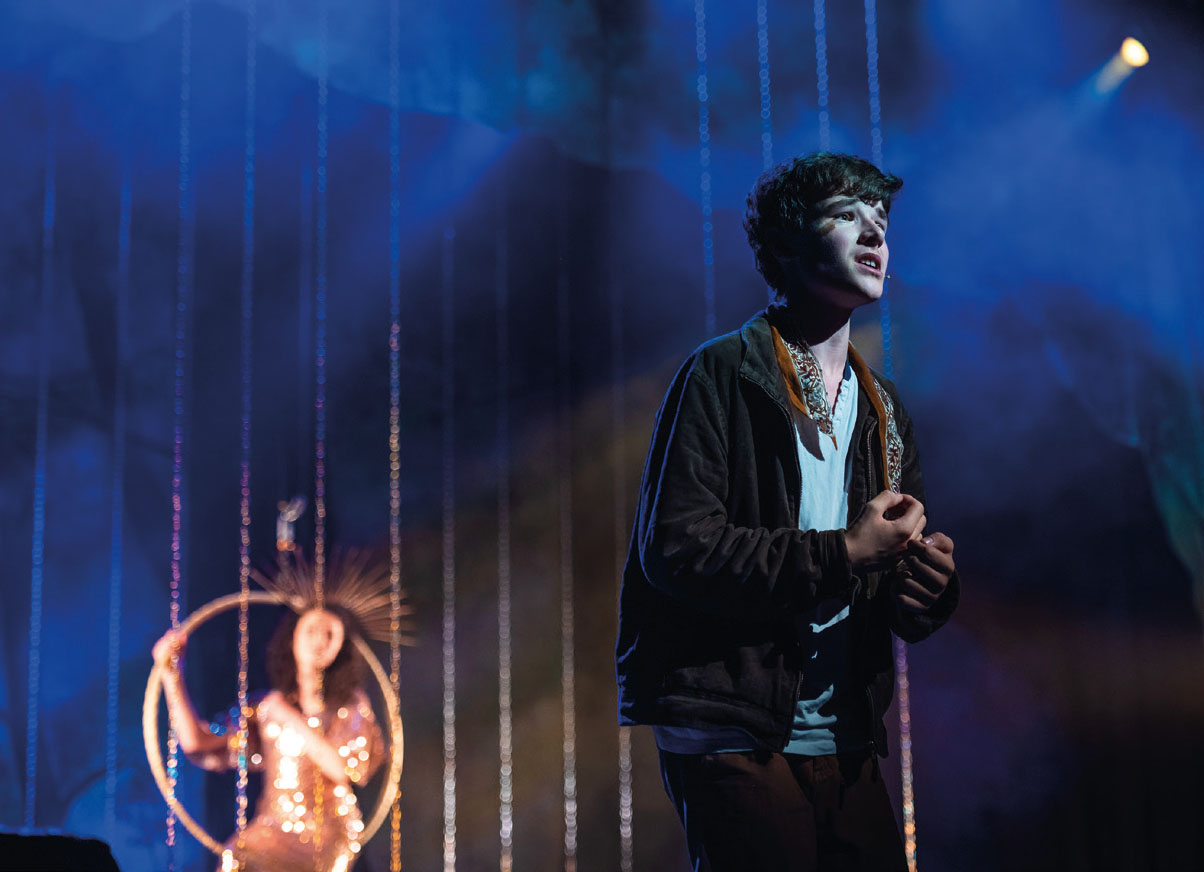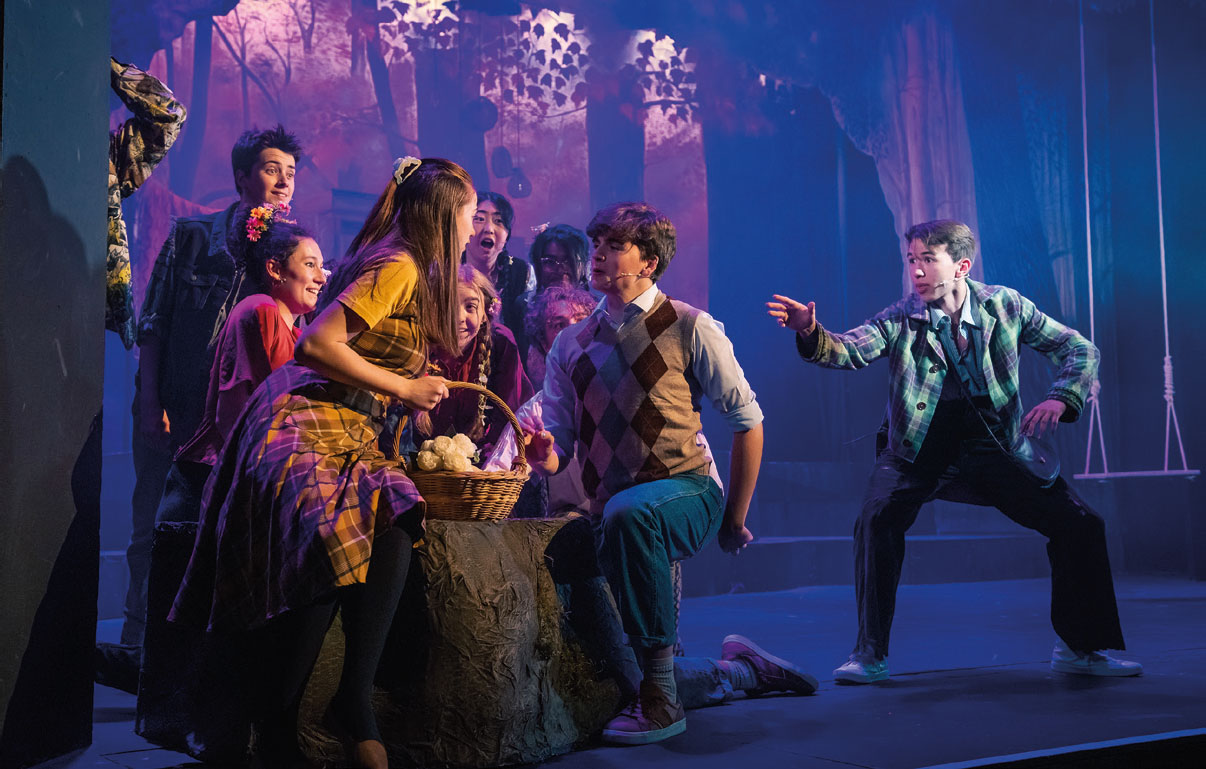
It's easy to assume the appeal of getting involved in a musical, forgetting that singing and dancing on stage lies far outside the comfort zone of most teenagers, and for some represents the seventh circle of hell. But musical theatre has the power to bring a cast of disparate children together in a truly joyous enterprise and is thus one of the most valuable undertakings in the life of a school.
A successful foray into musical theatre relies significantly on effective collaboration between music and drama departments, ideally going well beyond a simple division of labour. My school stages at least one musical a year, often more. This year, revelling in live audiences and the lifting of singing restrictions, we staged six across our Junior and Senior schools. This sounds excessive, but the first key to engaging pupils with musical theatre is simply to make it a staple of the calendar. Normalising the act of singing and dancing on a stage should happen as early and as often as possible.
It is, of course, vital for the director and musical director to select a show collaboratively, considering the obvious strengths of relevant year groups and individuals. An absolute must for me is ensuring that the chorus has enough to do on stage, which is why (for example) we've never put on The Sound of Music, as much as I enjoy the film. In my experience, pupils will quickly fall in love with any show they find themselves in. We staged The Pirates of Penzance this autumn, which was something of a gamble since barely any of the pupils had heard of Gilbert and Sullivan, but it proved an immensely uplifting experience for all involved and, within a week, the strains of ‘With catlike tread’ could be heard echoing down the corridors.
 World premiere of Bob Chilcott's Birdland © Andrew Warmsley
World premiere of Bob Chilcott's Birdland © Andrew Warmsley
Supporting characters
Equally as important is making the auditions feel as fun and inclusive as possible to encourage those who may well be overawed by other pupils who have been to Stagecoach from the age of four and have already memorised the entire libretto. A format which has worked well for us is to audition a large group (of, say, 30) collectively, teaching them the verse of a song and some basic accompanying choreography. Only those who wish to audition for a solo role then stay behind for short singing and acting auditions. We make a point of accepting everyone who auditions into the company, partly because there is safety in numbers for a nervous first timer.
It's at the casting stage that cracks could begin to emerge between the drama and music department personnel in the room: the pupil with the best voice may well not have the most acting potential, and vice versa. Selecting shows with a good range of supporting characters is one way to navigate this. We have a number of former choristers with wonderful voices and limited acting experience who would struggle as a romantic lead but are perfect as an Enjolras (Les Misérables) or Lord Evelyn Oakleigh (Anything Goes). Ultimately, for theatre to work, a character has to be believable on stage, which may well mean casting the compelling actor over the star singer in a book musical. In a sung-through show, the decision may well go the other way.
Constant interplay
This give and take between music and drama elements is also a key part of a successful rehearsal process. It's easy for a director to feel redundant for the first few weeks while the cast are learning songs; similarly, once rehearsals are more advanced, an MD can feel relegated to the role of rehearsal pianist. Constant interplay in the rehearsal room is vital for a good working relationship, and there is plenty that drama and music staff can absorb from one another in terms of rehearsal skills and techniques. I have learned a lot about vocal technique from watching our head of music lead singing rehearsals, while I am able to contribute usefully in terms of developing character through song and helping push chorally trained singers towards a more natural musical theatre delivery.
In my school, most pupils who audition can sing to a decent standard: far fewer have any formal dancing experience. Starting rehearsals with silly physical warm-up games (even something as simple as Grandmother's Footsteps) is an easy and fun way to make pupils feel more confident using their bodies. Likewise, there is limited dance expertise among our music/drama staff, so bringing in a sympathetic choreographer who will push the pupils hard while recognising their limitations is a good option. At the top end, we always try to find exciting opportunities for our best dancers, whether acting as dance captain within a production or sometimes in a specially devised showcase of song and dance.
 Magdalen College School's production of Leave it to Puck! by MCS teachers Alex Thomas (drama) and John Mann (music) © COURTESY MAGDALEN COLLEGE SCHOOL
Magdalen College School's production of Leave it to Puck! by MCS teachers Alex Thomas (drama) and John Mann (music) © COURTESY MAGDALEN COLLEGE SCHOOL
Opening doors
The culmination of our bumper year of musicals was a double bill of new one-act works, performed this summer at Oxford Playhouse. The first, Leave it to Puck! was a collaboration between myself and a member of our music department, which was enormous fun to write and rehearse. The second half was the world premiere of Bob Chilcott's Birdland, a community musical drama which involved 400 primary school children coming to the Playhouse to perform in a sing-along version, captured on BBC South. The palpable excitement of these children during the process was tribute to the power of musical theatre.
In the morning, our musical director rehearsed the songs with the massed choirs and band, raising the roof with Chilcott's beautiful and uplifting melodies. In the afternoon, we added all the magic of theatre: costumes, lighting, set and props. The children frequently forgot to sing; they were so enraptured by the spectacle. It felt like the most worthwhile piece of theatre I've ever directed, particularly when it emerged that a large proportion of the children had never set foot in a theatre before and many of them had barely sung at school due to the pandemic. It just goes to show that with a collaborative approach and willing pupils, musical theatre really can open doors.




